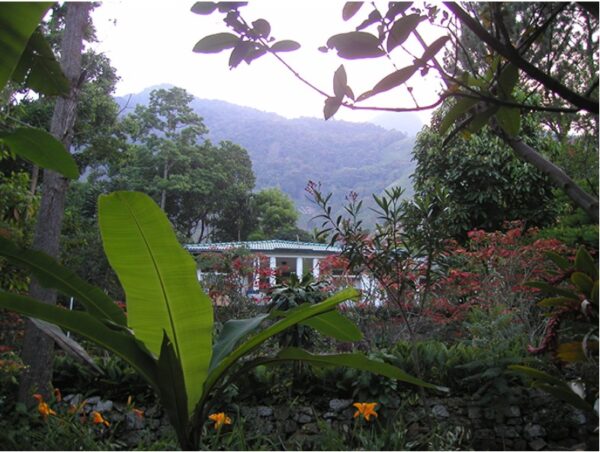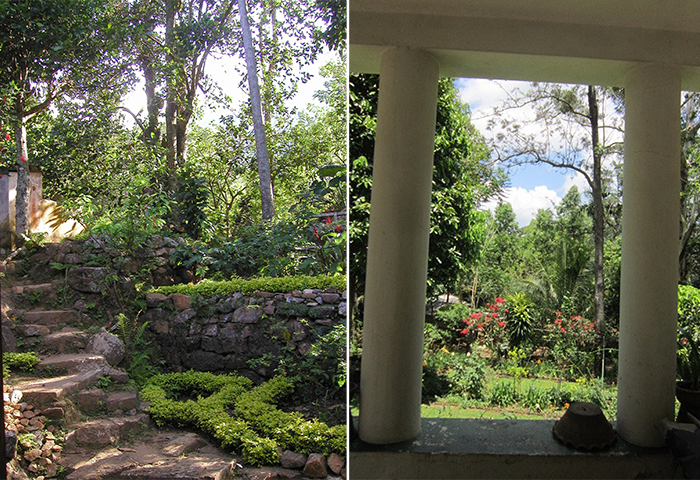The Retreat-By Michael Patrick O’Leary

Source:Island
Twenty years ago, we moved from a land without snakes to a place where snakes abound. St Patrick (allegedly) drove all the snakes out of Ireland. There is a job for him in Sri Lanka (if only he exists). I heard my wife scream from the bathroom. She had trodden on a snake which looked about ten feet long. Distinctly displeased, it slithered sullenly out of the house. I am told the garandiya is not dangerous – unless you happen to be a rodent. It is not venomous – but you wouldn’t welcome a bite from it.
Deadly serpents were spotted in our Garden of Eden. We suspected that Pipistrelle, one of our dogs, died after being bitten on the snout by a Russel’s viper. The krait is a particularly unpleasant fellow, who has a habit of hiding its head under its flattened body and concealing itself under piles of leaves. It has been known to indulge in cannibalism. You stop breathing if you don’t get rapid treatment for a bite. One night we were sleeping soundly when our cat alerted us at 3 a.m. to the presence of a krait on our bedroom floor. We calmly swept it into a bucket and disposed of it outside.
Another night we saw six baby serpents emerging from a hole in the wall near the kitchen door. One day, I heard a susurration in the tea bushes two feet to my left and a spectacled cobra came towards me, fanning out its hood and staring. I stared back. We both made our excuses and left. My philosophy is, “if you leave them alone, they will leave you alone”.
Someone asked me if I missed the Cork rain. I said that I missed its moderation. Despite occasional droughts, in Uva, it sometimes felt as if the rain persisted for 25 hours a day, 13 months a year. Even indoors, it felt as though we were living underwater. After heavy rains, our river roared like an angry god and during calmer times it sounded like human voices murmuring or a radio on low volume. The rain flushed out scorpions like prehistoric Humvees, centipedes like malevolent moustaches and swarms of suicidal meroos emerging from holes in the wall and heading for the lights to provide fodder for frogs.
When we lived in Bandarawela, our water supply was metered, paid for and rationed. There were often periods when no water at all was available. After moving to Gonagala in 2003, we were never short of water in our house but the nearby villages sometimes needed bowsers to bring water in. At Gonagala, a tributary of the Menik Ganga (Gemstone River) formed the boundary of one side of our acre.
We live in a place of water.
Our house rests in the embrace
Of streams gushing
From the heights of Namunukula.
Spouts feed the fruit.
Rivulets plash into tarns
Collecting down in the paddy,
Birthing pools for mosquitoes.
All night, rain surrounded our senses
As if we were underwater.
The susurrating storm flushed
Scorpions from the dank undergrowth.
Giant black beetles battered
Doors and windows for admittance
To the light.
In the morning, sharp light focuses
Lunugala, free of its customary
Wisps of cloud.
All around the house,
Mass suicide of meroos – ants
Conscientiously eat the cadavers.
A black robin, its blackness so profound
That it strains the boundaries of black,
Transgressing into iridescent blue,
Framed against the azure,
Calls us out to the sun.
Our household water came straight from the Namunukula Mountains. It is difficult to stomach Colombo or London water after this because it reeks of chlorine. The frequent and lengthy heavy downpours could make Namunukula water muddy, and there were numerous cattle, goats and monkeys to shit and piss in it before it reached our house, but we got it to a clear state by filtering it through a series of tanks and pumps and boiling it. The garden was always lush because we set up a series of pipes and taps on all the terraces. Any surplus water flowed back into the river.
Too much water from the skies sometimes meant our water supply was threatened. Incessant heavy rain for over a month in the October monsoon brought down about a kilometre of road above our property. The landslide rearranged the water courses and the crashing boulders irreparably broke the channels that customarily brought water into our land. We soon got together a rapid reaction force to assemble a system of pipes to pump up water from the river.
Although there was much rain and wind, sometimes the sun was intense. This combination gives Uva tea its unique flavour. There was plenty of shade from the many trees in the terraced garden. The house was built of black stone (like our Irish cottage, The Sanctuary) and had good ventilation so there was no need of AC and we rarely used fans. In Ireland, we built fences to stop rabbits eating the lettuce. Here fencing will not stop the monkeys from the jungle eating our guavas. Our cousins the monkeys show typically human selfishness and wastefulness. I watched a monkey sitting in our peach tree, fruit in each hand, both of which will be discarded half-eaten.
They picked avocadoes when they were still hard and then cast them on the ground in frustration. They also ate clothes pegs. I have seen the tiny intricate nests woven by tailor birds thrown to the ground by the monkeys, the eggs smashed to shards. The dogs went berserk when the monkeys arrived, emitting a particular piercing howl dedicated to monkeys. The monkeys responded by derisively throwing their shit at the dogs.
The borderline between man and nature is porous. Even in Ireland, it was not easy to impose order in our garden newly hewn from meadow. There rested and rusted a gate bought from a traveller, a barrier to deter errant sheep, a boundary to mark what we had bought from nature, human purpose stamped on wild fecundity. The gate disappeared in a tangle of thistles tall enough to look me in the eye.
Our vegetable production was not as successful in Uva as it had been in County Cork. Apart from beans, we had little success in growing “English” vegetables. The soil was sandy and was eroded by heavy wind and rain. We did our best to rearrange the flow of the water and to enrich the soil with compost and manure from our neighbors’ cattle. In County Cork, we were surrounded by farmland and all of the farmers were called Barry. John, James, and Dan (who had a finger missing) and a non-Barry called Walter. Perhaps that was why it was called the Barony of Barrymore. More Barrys than you could shake a shillelagh at. John Barry had sheep, cows and elegant racehorses. All our neighbouring farmers were generous in their donations of shit. We got a fine concoction of manure from the fragrant horseshit, mixed with sheep, cow and kitchen waste with a special ingredient of seaweed fresh from the strand. Plus a dash of citrus from the lemons we had with our gin and tonic. Our compost was a potent concoction which smelt good enough to eat.
We were fortunate that there were many good things that Mother Nature provided without any effort on our part, jak, billing, avocado, lemon, lime, grapefruit, pomelo, loquat, oranges, guavas, pomegranates, coffee.

We lived in the middle of a tea estate. Sun and rain brought lush abundance in myriad shades of green. Plants familiar in the west as tame houseplants – bromeliads, anthuriums, money plant, and amaryllis – were rampant in the wild. The plant sold in small pots in the west as cheese plant, monstera deliciosa, grows wild to a height of 100 feet with leaves big enough to shelter a family of monkeys.
Mother Nature invaded the house itself. One evening a gecko landed in my eye. On another occasion a baby rat landed on my head. It was rather disconcerting to observe that the sugar was on the move as huge red ants tried to escape from the jar. I prefer my food to be immobile. I did not much like the way, in another jar, evil little weevils reduced the chick peas to gram flour. In the bathroom, mosquitoes the sizes of small helicopters emerged from the toilet bowl and swarms of wasps landed on my head. In the shower, a small frog, the size of a mung bean, with big bulging eyes like Ray Bans, glared at me. A larger frog, warty as Robert Redford, leapt around the tiles.
Taking an improving tome from the shelf, I discovered that I was holding only the spine in my hand and a pile of dust; armies of white ants hurtled about the shelves carrying their eggs. The library ate my books. There are 67 accepted species of booklice in Sri Lanka. The scientific name for this order of insects is Psocoptera. They first appeared in the Permian period, 295–248 million years ago. Were there any books to devour then? They are often regarded as the most primitive of the hemipteroids. Many species live gregariously. Mating behaviour can be elaborate but I will not go into detail in a family newspaper.
Sometimes hooligan elements of the rodent domain set up home as squatters in the car and ate various bits of foam and plastic. No doubt, they will soon set to work on something important like the brake cables. Small, but probably rabid, bats flew dangerously close to my face as we relaxed in the evening with a glass or two on the porch. Much larger sinister bats, hung like innumerable Christopher Lees from the Sapus. In an Irish summer it was sometimes still light at midnight. It gets dark early in the Sri Lankan mountains (“It gets late early”, as my father used to say.) However, true darkness never descended on the bedroom. Fireflies blazoned the night, roosting in my hair like stars. It was like trying to get to sleep inside a fully lit Christmas tree.
During the day a serpent eagle rode the thermals looking for snakes full of frogs which were full of ants and flies. I think it may have had its eye on the cat, which was full of geckoes. Huge skrawking crows circled doomily around the Muslim slaughterhouse next door. Large frogs hopped about eating the flying ants. Coucals (of the subfamily Centropodinae and the genus Centropus) and snakes carried away the frogs for supper.







